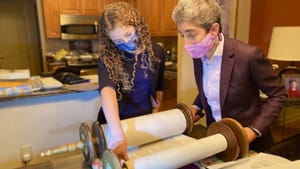Stay in the Loop
BSR publishes on a weekly schedule, with an email newsletter every Wednesday and Thursday morning. There’s no paywall, and subscribing is always free.
Bring on the Zoomitzvah
What happens when the stress of the pandemic leads to a surprising yes?

My cousin Kenny called on a Wednesday morning to talk about his youngest child’s bat mitzvah.
“I’m thinking of having it a little early,” he said.
Scout had just turned 12—old enough, according to Jewish custom, to mark her coming of age by leading prayers and chanting from the Torah. But in the United States, kids typically have their bar or bat mitzvahs at 13, and I figured my cousins were planning on the usual—a synagogue service followed by a DJ’d blow-out at the Hilton, with a cocktail hour and monogrammed party favors—sometime in late 2021.
“Um…how early?” I said.
“Like, this Sunday.”
Why now?
It’s no secret to anyone in my family that Ken and his wife, Tracy, occupy the opposite end of the planfulness spectrum from my partner Elissa and me.
Pre-pandemic, when people traveled to places more far-flung than Trader Joe’s, Elissa and I would pore over maps, compare Yelp reviews to sleuth out the best tacos on the Lower East Side, and order theater tickets months in advance. Ken, Tracy, and their three kids have been known to jump in the car and head for New York, Googling “affordable hotels” somewhere around exit 10 of the Jersey Turnpike.
But a bat mitzvah in four days?
Ken had his reasons. His mother, Scout’s beloved Bubie, was in failing health. Our Arizona cousins were headed to Philly for the weekend. Sunday night was Rosh Hodesh, the start of a new Jewish month…and it just happened that Scout, who attends Jewish day school, already knew the Torah portion traditionally chanted on that date.
“I’ve got all day”
I guessed what was coming next.
“So, I asked Scout if she wanted our rabbi to lead the service. She said no. I said, ‘How about my Orthodox friend?’ She said no. I asked, ‘Who do you want, then?’ She said, ‘Anndee.’”
I am not a rabbi. But as a semi-literate Hebrew reader who’s active in her Reconstructionist synagogue, knows a lot of poetry, and can more or less carry a tune, I’m the closest thing my family’s got.
I told Ken I’d call him later. I spent an hour obsessively listing all the reasons why we could not possibly hold a bat mitzvah service in four days. I had two articles on deadline. Scout would need to write a speech. And where would we get a Torah on short notice?
Then I thought about the late, great writer Grace Paley, who once had an interviewer gush over her poetry, teaching, and activism—“Oh, Ms. Paley, how do you have time to do it all?”—and answered drily, “Well, I’ve got all day, don’t I?”
I had all day. By afternoon, every item on my list started to yield. And by dinnertime—especially after I’d talked to a bubbly, confident, I’m-all-in-with-this-plan Scout—I was on board.
Because of the terribleness
I think COVID helped push me over the fence. This pandemic has forced so many of us to live in a way we once would have believed untenable. We wear masks to greet the mail carrier. We don’t hug our friends. We hold drive-by birthday parties. We go to school, or to work, on Zoom.
These last eight months have been exhausting and anxiety-provoking, devastating and enraging. The mother of a childhood friend died of COVID-19 in May. My daughter, after a close brush with someone who was infected, spent two weeks quarantining in our house, eating meals in her bedroom and yelling if we breached the six-foot radius around her.
But this pandemic has also been clarifying. What matters, when your world shrinks to the perimeter of your block? How do we comfort each other when we can’t touch? Where do we find hope when the news—COVID infections rising, fires tearing across the west while floodwaters swell in the east—is so relentlessly grim?
My high school friend Barak once told me that he was about to drive eight hours round-trip to see his mother for brunch: “Not because she might be in the hospital next year, but because this year, she’s not.”
Right. For the fortunate ones, this year, or, at least, this moment, we’re not. COVID has reminded me—diligent strategist, type-A planner that I am—that none of us can glimpse what’s coming round the bend. In spite of all its gravity—actually, because of the terribleness that surrounds us—this strange, strained time has prodded me to notice, and to cherish, and to say yes, now.
Voices join
Scout celebrated her bat mitzvah on the eve of the month of Heshvan. Eleven of us gathered, masked, in her grandparents’ apartment, while another dozen relatives tuned in via Zoom.
It turns out you can rent a Torah from some rabbis in Brooklyn, as long as it’s sent FedEx before sundown on Friday. We unrolled the thick parchment and blessed it before Scout chanted, with musicality and poise, 15 verses from the Book of Numbers.
Her Bubie, upright in her wheelchair at the far end of the dining-room table, murmured the Sh’ma, Judaism’s central prayer. And when it was time for “Hallelujah,” all of us—near and remote, healthy and frail, located in Philadelphia, Tuscon, Ventnor, and Boston, summoned by an ancient text invigorated by a new, young voice—sang Zoomily, discordantly along.
Image description: A photo of Scout, a 12-year-old girl with long, curly hair, next to Anndee Hochman, a woman with short gray hair who wears a dark blazer. They are standing in a home kitchen, leaning over a Torah scroll. They’re both wearing facemasks.
Sign up for our newsletter
All of the week's new articles, all in one place. Sign up for the free weekly BSR newsletters, and don't miss a conversation.

 Anndee Hochman
Anndee Hochman